liver support
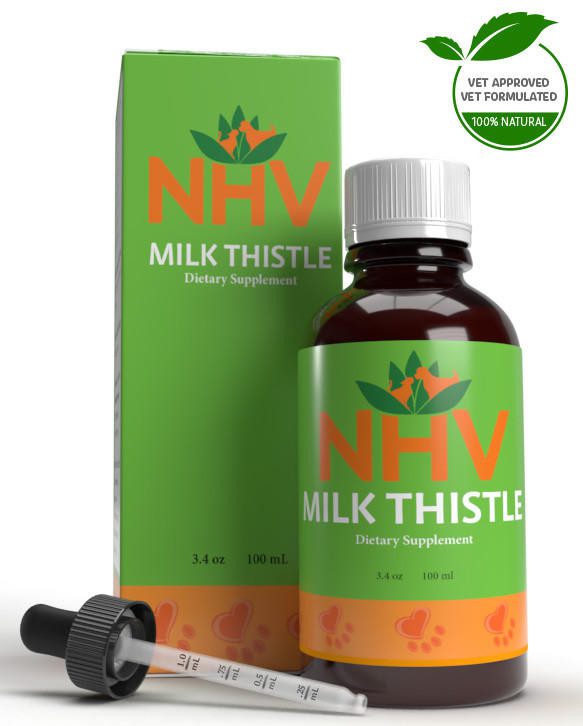
free shipping over $100 (USA & Canada)
1-877-937-4372 the pet expert hotline
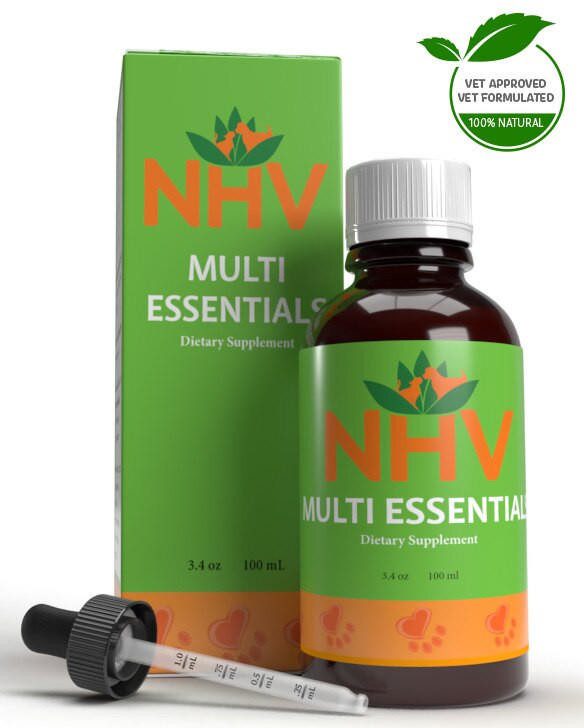
Herbal multivitamin, digestive aid and energy booster for birds.

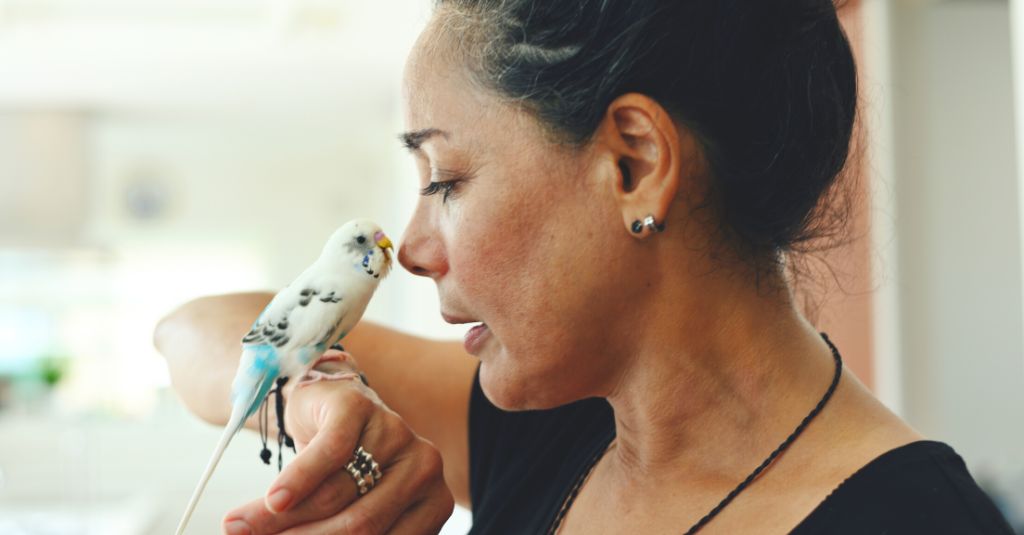
Keeping pet birds can be very rewarding but caring for them requires a lot of responsibilities. Before bringing a bird home, it is important to learn about them and how to take care of a bird.
Birds are a group of warm-blooded vertebrates constituting the class Aves characterized by feathers, toothless beaked jaws, the laying of hard-shelled eggs, a high metabolic rate, a four-chambered heart, and a strong yet lightweight skeleton.
There are many different species of birds and how to take care of a bird will differ for each one. In this way, talking to a veterinarian that is a specialist in birds is highly recommended. It is also helpful to review how the various types of birds differ based on their lifespan, personality, noise level, care requirements, etc.
Talking to a veterinarian that is a specialist in birds is highly recommended.
Some studies have estimated 9,700 different kinds of birds, including flightless birds, such as penguins. However, the most common and popular type of pet bird is Parakeets. They are very friendly and affectionate pet birds when properly trained and cared for. Other common pet birds are Cockatiel, Finch, Auscape, Lovebird, Monk Parakeet, Dove, Parrotlet, Parrots, etc.
The average lifespan will really depend on the breed. For example, Parakeets live an average of six years but can live as long as 18 years. Cockatiels live 16 years on average, but many have lived for more than 30 years. Finches live an average of four to five years, but life spans of three times that have been documented.
The diet will vary depending on the species. However, you should feed your bird based on breed and a combination of both high-quality commercial food and some natural food. For example, your bird’s diet should include a variety of fresh vegetables. Most birds love dark, leafy greens, zucchini, and broccoli, as well as other vegetables such as squash, shredded carrots, snow peas, parsley, cucumbers, and romaine lettuce. Avoid avocado, onion, and garlic, which can be harmful to them.
It is very important to talk with a veterinarian specialist in birds to make sure that the diet that you are offering to your pet bird is adequate. An unbalanced diet can bring a lot of health problems and sometimes can be life-threatening.
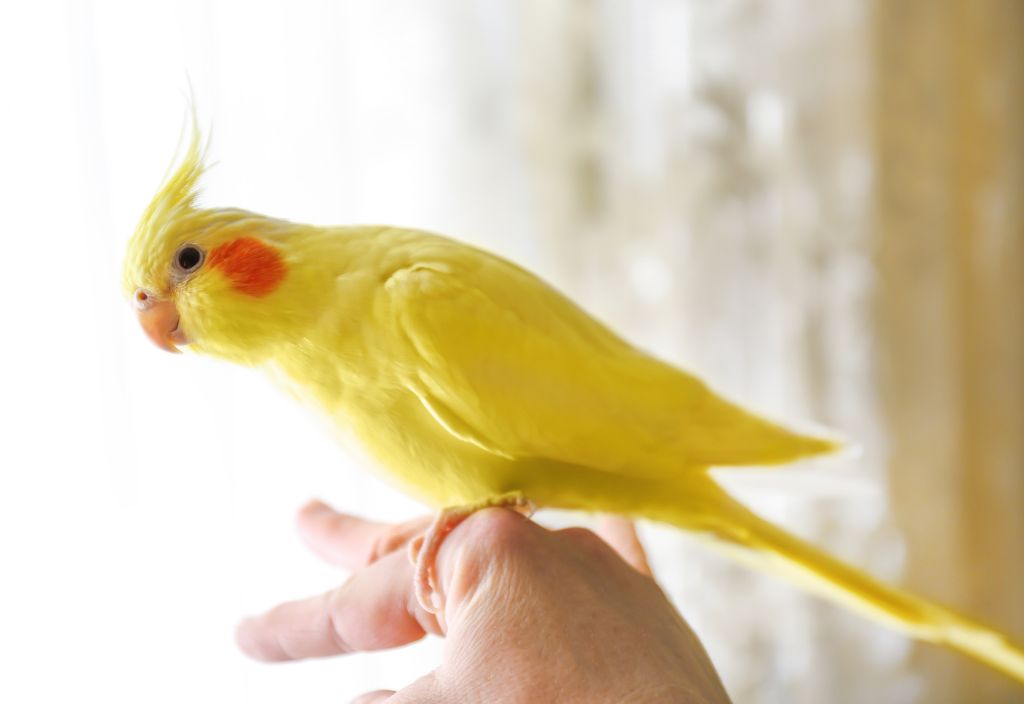
When handling your bird, it’s important to remember to always be as gentle as possible. Never squeeze your bird or hold it too firmly, even if they resist handling. Doing so could break one of your pet’s bones, damage their internal organs, or worse. Most birds cannot do any serious damage to a human when trying to be handled. It’s important to note that some of them can bite hard and peck while others can make intimidating noises.
Some birds such as ducks, chickens, cockatiels, and cockatoos do enjoy a little cuddling and petting. It depends on how the pet owner handles the bird and the bond between the pet owner and the bird.
Cage doors should be large enough for your bird to enter easily, but make sure they are secure so your bird cannot open them. Place the cage in an area that is free of drafts, away from kitchen heat and cooking fumes, and out of heavy “traffic” areas in your home.
In general, birds need places where they can hide from predators and inclement weather. Trees, shrubs, meadows, and even rock walls provide such shelter. Natural sources: Native trees and shrubs of different densities and heights give birds places of retreat and safety.
The best toys for your bird will depend on your bird’s species, personality, likes, and dislikes. Watching your pet and some trial and error will help you to discover what kind of toys your bird likes the most. Pay attention to the materials used for your bird’s toys and ensure that they are all non-toxic.
Finding fun toys for your bird to toss around and play with outside of the cage can promote good exercise habits as well. For example, things like ropes and ladders for your pet to climb on can encourage movement and the working of major muscle groups in your bird.
Regarding hygiene, dirt, dust, feces, leftovers, and feather dander accumulate constantly in the cage. It is essential to scrub down the entire cage at least once per week with a non-toxic disinfectant soap and hot water.
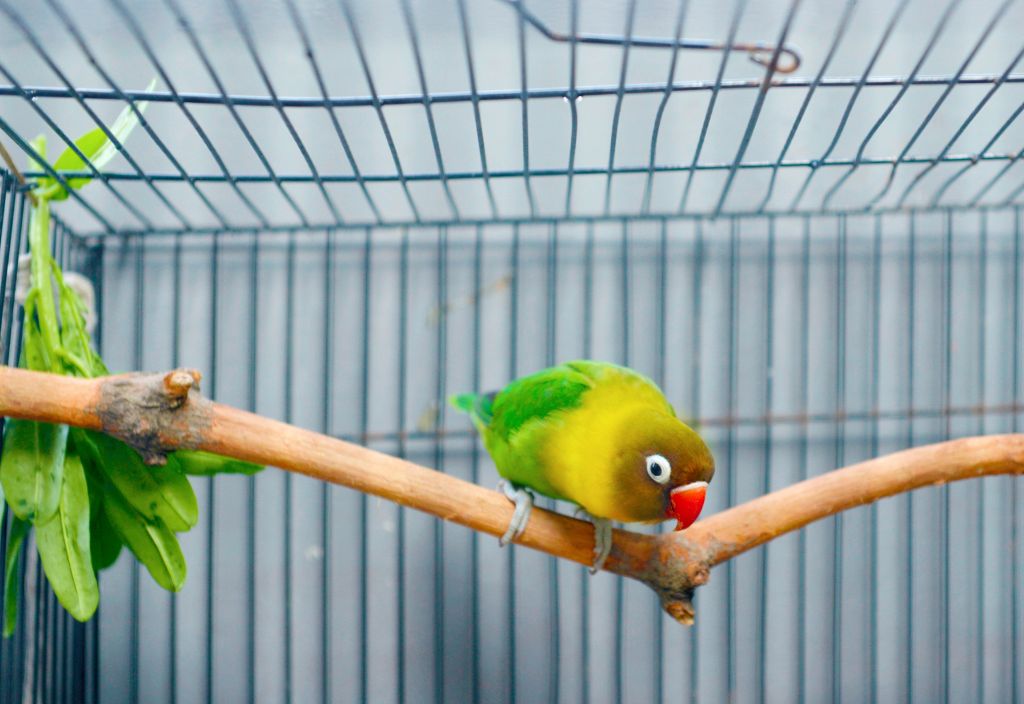
Many NHV supplements are safe for birds and are beneficial for supporting their overall health. They can be used proactively or to support feathered friends with diagnosed health conditions. All of the supplements are vet-formulated and in liquid form for easy administration.
Recent research has shown that balanced omega 3 and 6 fatty acids in the diet are good for a whole host of bodily functions. Omega 3 & 6 fatty acids are essential for egg-laying, bird growth, and immunity. It is rich in vitamin A, D, and E. Vitamin A is important for cell development in the embryo. For proper absorption and utilization of calcium and phosphorus, your bird requires vitamin D. It also helps with bone growth and eggshell formation. Vitamin E is an antioxidant and helps maintain cell membranes.
This blend of five mushrooms can have many benefits for your pet bird. Mushrooms are a rich source of antioxidants, vitamin B, copper, and potassium that are essential for your pet bird’s well-being.
Studies show that Turmeric aids the health and lifespan of birds. Turmeric helps the stimulation of the digestive system, the rate of growth, and the weight of birds. However, Turmeric is an anti-coagulant. As a precautionary measure, avoid it when a bird is molting or has an issue with a broken blood feather.
The main reason for administering milk thistle to a pet bird is for treating liver issues. Liver disease in birds usually is caused by a poor diet, high in fat and calories, which can lead to a distended liver, breathing issues, and poor feather quality. Pharmaceuticals and viral or bacterial infections can cause liver disease as well. Therefore, adding Milk Thistle to your bird’s diet may help alleviate liver issues.
We recommend adding vitamins to your bird’s diet as they are helpful for general health. Vitamins that your bird needs include vitamin A, E, D3, and B-complex. Vitamin A is an important vitamin for the skin. Therefore, adding Multi Essentials can help fill the lack of vitamins in pet birds.
You can find yucca root in many commercial foods because it is rich in saponins and phenolic compounds with antioxidant effects. Dietary yucca may enhance immune function in pet birds, which was attributed primarily to its saponin component.
Coccidial infection in birds causes parasitic enteritis in multiple parts of the intestinal tract, leading to poor performance, loss of pigmentation, diarrhea, and mortality in severe cases. A series of studies showed that Yucca also has anticoccidial effects.
Therefore, adding yucca to your pet bird’s diet can be an effective food additive to promote the absorption of nutrients, blood profile, and antioxidant enzyme activities in pet birds.
Learning how to take care of a bird can seem overwhelming but there are many resources that can help. As mentioned, talking to a veterinarian with a specialty in birds can help you find answers to complex questions. You can also contact the team of NHV Pet Experts at any time for questions about natural support and supplements. You can start chatting with us now by tapping the button below.
liver support

Liver support for birds
buy 2 and save $3
3 month supply for a small to medium size pet



Milk Thistle contains a compound called silymarin and has been used for thousands of years by humans. Studies on Milk Thistle have shown that the flavonoids in silymarin to contain strong anti-inflammatory, antioxidant and detoxifying properties it also promotes cellular regeneration and repair. Milk Thistle is also known as wild artichoke and holy thistle, and helps remove toxic chemicals that can accumulate in your pet’s system. It is one of the few herbs with no equivalent in conventional medicine.
Milk Thistle for avian liver disease is naturally formulated to promote proper liver function and re-energize your pet. The silymarin compound detoxifies the liver and helps support, strengthen and regenerate liver function.
Research is showing that Milk Thistle improves kidney function. It is beneficial in supporting a pets kidney that may be damaged due to the use of drugs and radiation therapy, and for kidney damage caused by diabetes or infections.
Milk Thistle is used today as an anticancer support. Studies are showing that Milk thistle extract has an effect against cancer. This could be because Milk Thistle has very good antioxidant properties, which act as free radical scavengers. Research is showing that it may in fact help reduce or slow down the grown of certain cancer cell, and may protect and prevent cells from dividing in your pet's body.
Milk Thistle may used to help support a cat with:
Milk Thistle is a safe herb that is well tolerated by your bird. It is herb that is recommend and used by holistic practitioners
NHV Milk Thistle is glycerin based and safe for long-term use
For birds: 1 drop per two pounds twice a day
How to Administer
Shake well before use. The easiest method is to use the dropper provide and places the drops into your pet’s food or favorite treat. You can also use the dropper and squirt directly into the pet’s mouth.
Some pets can be finicky, if this occurs consider hiding the drops in foods most pet’s love such as mashed banana, strawberry or another favorite treat.
For Best Results
Herbal dietary supplements are beneficial to the health and wellbeing of your pet and are safe for long-term use. Every pet responds to natural herbal supplements differently, therefore it is important to be consistent and administer the product daily. Supplements generally take two to four weeks to take effect, however this will vary from one animal to the next.
Product Storage
All NHV Natural Pet Products are pure herbal extracts and contain no artificial additives, preservatives or coloring. Shelf life after opening is 6 months and must be refrigerated after opening.
Cautions and Contraindications
Do not use Milk Thistle in pregnant or nursing animals. Speak to your vet before using our products. A second visit is recommended if your pet’s condition does not improve, or deteriorates after continued use of the supplements.
All information provided by NHV Natural Pet Products is for educational purposes only.
Milk Thistle contains a compound called silymarin and has been used for thousands of years by humans. Studies on Milk Thistle have shown that the flavonoids in silymarin to contain strong anti-inflammatory, antioxidant and detoxifying properties it also promotes cellular regeneration and repair. Milk Thistle is also known as wild artichoke and holy thistle, and helps remove toxic chemicals that can accumulate in your pet’s system. It is one of the few herbs with no equivalent in conventional medicine.
Milk Thistle for avian liver disease is naturally formulated to promote proper liver function and re-energize your pet. The silymarin compound detoxifies the liver and helps support, strengthen and regenerate liver function.
Research is showing that Milk Thistle improves kidney function. It is beneficial in supporting a pets kidney that may be damaged due to the use of drugs and radiation therapy, and for kidney damage caused by diabetes or infections.
Milk Thistle is used today as an anticancer support. Studies are showing that Milk thistle extract has an effect against cancer. This could be because Milk Thistle has very good antioxidant properties, which act as free radical scavengers. Research is showing that it may in fact help reduce or slow down the grown of certain cancer cell, and may protect and prevent cells from dividing in your pet's body.
Milk Thistle may used to help support a cat with:
Milk Thistle is a safe herb that is well tolerated by your bird. It is herb that is recommend and used by holistic practitioners
NHV Milk Thistle is glycerin based and safe for long-term use
For birds: 1 drop per two pounds twice a day
How to Administer
Shake well before use. The easiest method is to use the dropper provide and places the drops into your pet’s food or favorite treat. You can also use the dropper and squirt directly into the pet’s mouth.
Some pets can be finicky, if this occurs consider hiding the drops in foods most pet’s love such as mashed banana, strawberry or another favorite treat.
For Best Results
Herbal dietary supplements are beneficial to the health and wellbeing of your pet and are safe for long-term use. Every pet responds to natural herbal supplements differently, therefore it is important to be consistent and administer the product daily. Supplements generally take two to four weeks to take effect, however this will vary from one animal to the next.
Product Storage
All NHV Natural Pet Products are pure herbal extracts and contain no artificial additives, preservatives or coloring. Shelf life after opening is 6 months and must be refrigerated after opening.
Cautions and Contraindications
Do not use Milk Thistle in pregnant or nursing animals. Speak to your vet before using our products. A second visit is recommended if your pet’s condition does not improve, or deteriorates after continued use of the supplements.
All information provided by NHV Natural Pet Products is for educational purposes only.
discomfort support

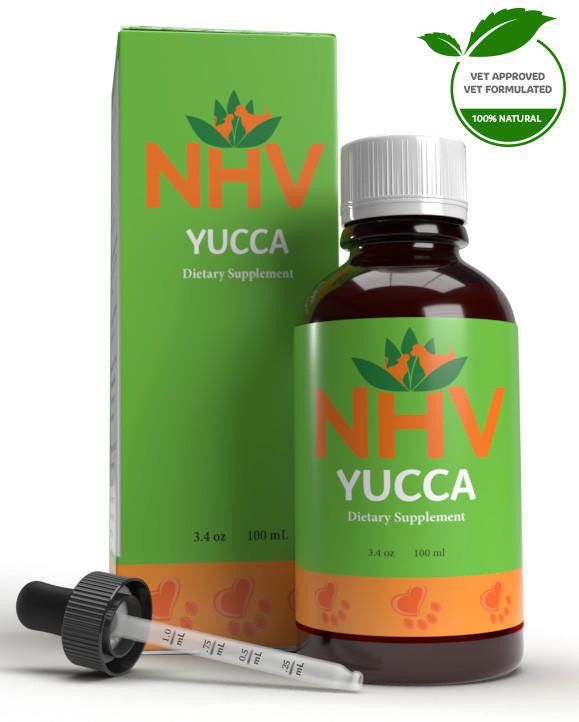
Support for Discomfort and Appetite Stimulant
buy 2 and save $3
3 month supply for a small to medium size
NHV Yucca is used for cats as a supplement to provide nutrients, and may be helpful for discomfort, inflammation, and to increase or balance the appetite.

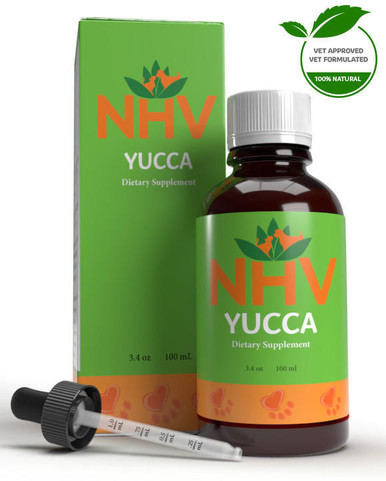
NHV Yucca is used for cats as a supplement to provide nutrients, and may be helpful for discomfort, inflammation, and to increase or balance the appetite.

Yucca is used in cat food as well as food for other animals around the world. Its root is a highly nutritious herb that’s rich in vitamin C, beta-carotene, B vitamins, magnesium, iron, calcium, manganese, protein, niacin, and phosphorus.
Yucca contains two very beneficial compounds: sarsasapogenin and smilagenin. These two compounds work on the mucous membranes of the small intestine. These compounds help with the penetration and absorption of minerals and vitamins. Sarsasapogenin and smilagenin are known as steroidal saponins (phytosterols) which act as precursors to corticosteroids produced naturally by the body.
Steroidal saponins support the immune function of the body while stimulating and supporting the production of its own corticosteroids and corticosteroid–related hormones. Due to this action, studies conducted on Yucca have shown that it may be beneficial and effective for discomfort relief and inflammation in conditions such as arthritis. Yucca for cats may also be a natural appetite stimulant and may also help reduce the production of urease, which contributes to the unpleasant odors of urine and feces in some cats.
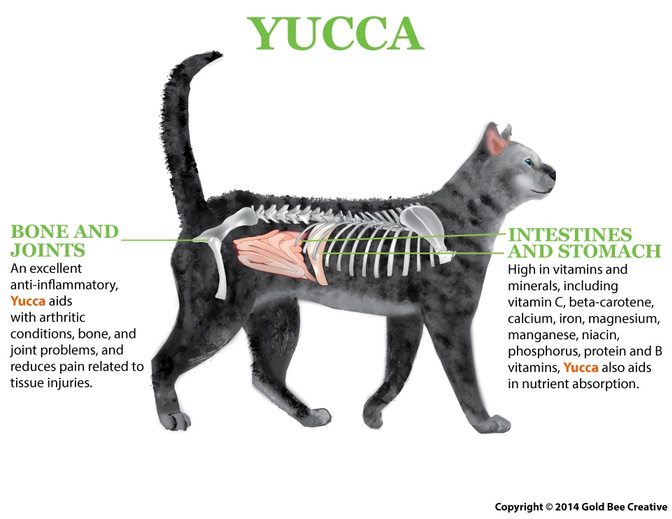
Yucca - Commonly used for supporting arthritis, as an anti-inflammatory, nutritive, antitumor, and digestive supplement.
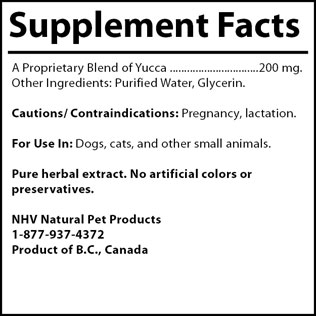
Select your pet's weight to determine the correct dose.
To be taken twice daily. Determine your pet’s weight and then use the easy chart below to determine the correct dose. This is the minimum dosage.
Pet's Weight Dosage
0 - 15 lb = 0.5 ml
16 - 30 lb = 1.0 ml
31 - 45 lb = 1.5 ml
46 - 60 lb = 2.0 ml
61 - 75 lb = 2.5 ml
Over 75 lb = 3.0 ml
How to Administer: Shake well before use. The easiest method is to use the dropper provided and place the drops into your pet’s food or favorite treat. You can also use the dropper and squirt directly into the pet’s mouth. Some pets can be finicky, if this occurs consider hiding the drops in foods most pet’s love such as fish, chicken, yogurt, or a favorite treat. If your pet only eats dry food then soak a few kibbles at feeding time.
For Best Results: Herbal dietary supplements are beneficial to the health and well-being of your pet and are safe for long-term use. Every pet responds to natural herbal supplements differently, therefore it is important to be consistent and administer the product daily. Supplements generally take two to four weeks to take effect, however this will vary from one animal to the next.
Product Storage:
All NHV Natural Pet Products are pure herbal extracts and contain no artificial additives, preservatives or coloring. Shelf life after opening is 6 months and must be refrigerated after opening.
Cautions and Contraindications
Do not use Yucca in pregnant or nursing animals.
Speak to your vet before using our products. A second visit is recommended if your pet’s condition does not improve, or deteriorates after continued use of the supplements. All information provided by NHV Natural Pet Products is for educational purposes only.
Yucca is used in cat food as well as food for other animals around the world. Its root is a highly nutritious herb that’s rich in vitamin C, beta-carotene, B vitamins, magnesium, iron, calcium, manganese, protein, niacin, and phosphorus.
Yucca contains two very beneficial compounds: sarsasapogenin and smilagenin. These two compounds work on the mucous membranes of the small intestine. These compounds help with the penetration and absorption of minerals and vitamins. Sarsasapogenin and smilagenin are known as steroidal saponins (phytosterols) which act as precursors to corticosteroids produced naturally by the body.
Steroidal saponins support the immune function of the body while stimulating and supporting the production of its own corticosteroids and corticosteroid–related hormones. Due to this action, studies conducted on Yucca have shown that it may be beneficial and effective for discomfort relief and inflammation in conditions such as arthritis. Yucca for cats may also be a natural appetite stimulant and may also help reduce the production of urease, which contributes to the unpleasant odors of urine and feces in some cats.

Yucca - Commonly used for supporting arthritis, as an anti-inflammatory, nutritive, antitumor, and digestive supplement.

Select your pet's weight to determine the correct dose.
To be taken twice daily. Determine your pet’s weight and then use the easy chart below to determine the correct dose. This is the minimum dosage.
Pet's Weight Dosage
0 - 15 lb = 0.5 ml
16 - 30 lb = 1.0 ml
31 - 45 lb = 1.5 ml
46 - 60 lb = 2.0 ml
61 - 75 lb = 2.5 ml
Over 75 lb = 3.0 ml
How to Administer: Shake well before use. The easiest method is to use the dropper provided and place the drops into your pet’s food or favorite treat. You can also use the dropper and squirt directly into the pet’s mouth. Some pets can be finicky, if this occurs consider hiding the drops in foods most pet’s love such as fish, chicken, yogurt, or a favorite treat. If your pet only eats dry food then soak a few kibbles at feeding time.
For Best Results: Herbal dietary supplements are beneficial to the health and well-being of your pet and are safe for long-term use. Every pet responds to natural herbal supplements differently, therefore it is important to be consistent and administer the product daily. Supplements generally take two to four weeks to take effect, however this will vary from one animal to the next.
Product Storage:
All NHV Natural Pet Products are pure herbal extracts and contain no artificial additives, preservatives or coloring. Shelf life after opening is 6 months and must be refrigerated after opening.
Cautions and Contraindications
Do not use Yucca in pregnant or nursing animals.
Speak to your vet before using our products. A second visit is recommended if your pet’s condition does not improve, or deteriorates after continued use of the supplements. All information provided by NHV Natural Pet Products is for educational purposes only.
overall vitality
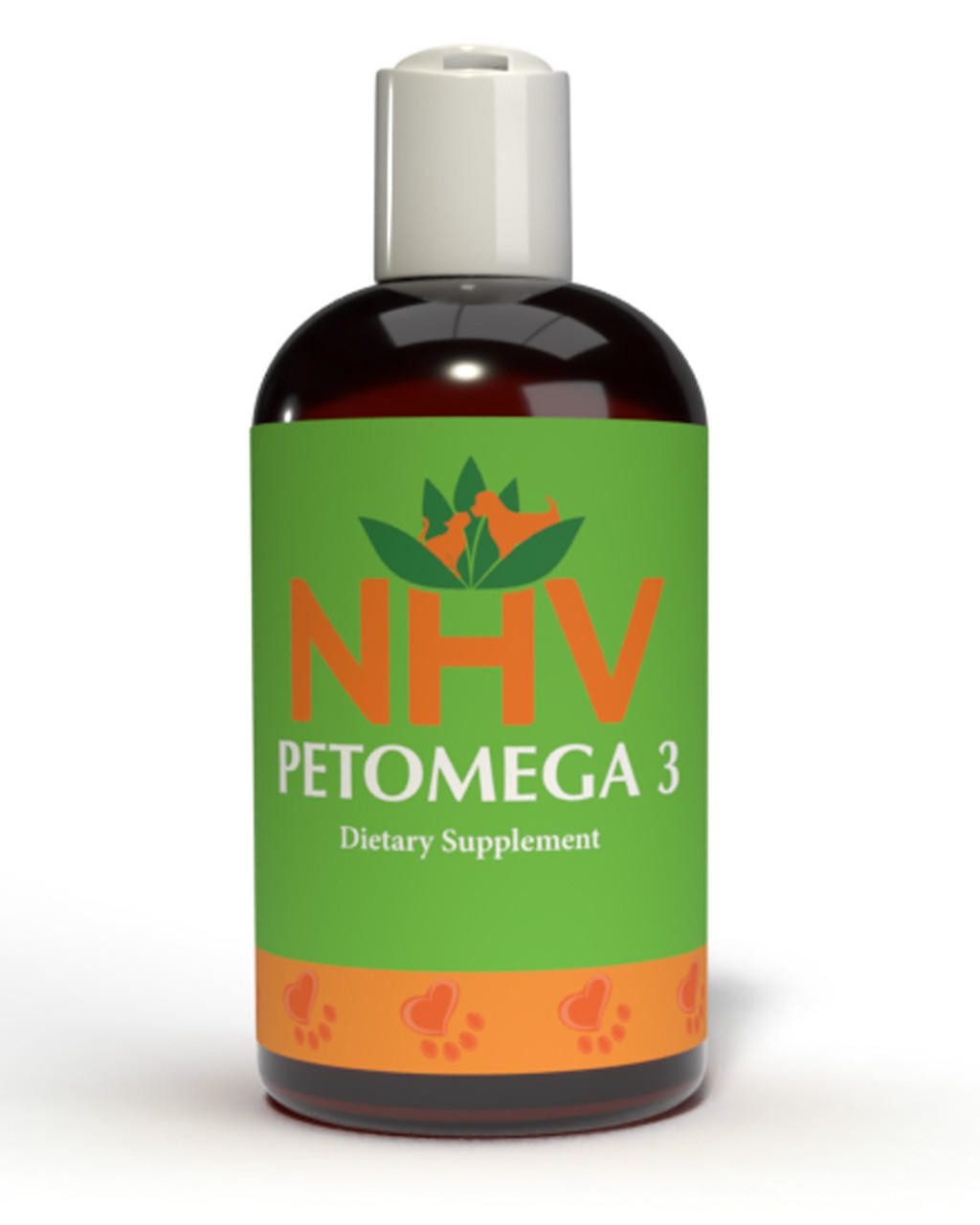
For Overall Health and Well-Being
buy 2 and save $3
An Omega 3 supplement for cats to support their joints, heart, eyes, immune system, and overall organ function.

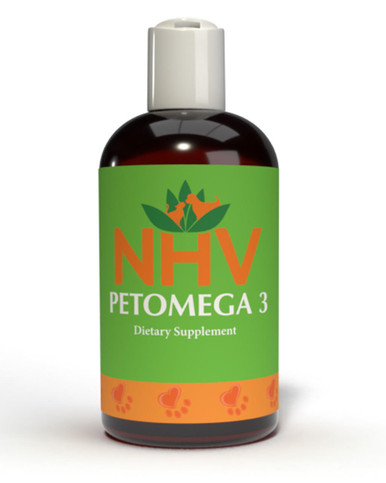
An Omega 3 supplement for cats to support their joints, heart, eyes, immune system, and overall organ function.

Our cat omega 3 supplement is naturally made from the oils of sardines, anchovies, and North Atlantic cod. It’s an excellent source of EPA (Eicosapentaenoic Acid 600mg) and DHA (Docosahexaenoic acid 460mg) essential omega 3 fatty acids. It’s molecularly distilled and cold-pressed to improve the bioavailability
Support your cat with human-grade quality omega 3 fish oil supplements. Many processed pet foods are deficient in this important nutrient. And according to the University of Maryland Medical Center, "It is very important to maintain a balance between omega-3 and omega-6 fatty acids in the diet. A proper balance helps maintain and even improve health."
It’s important for cats to get essential fatty acids through their diet. This omega 3 supplement for cats will help keep them healthy, and even finicky cats actually like to take it.
Benefits of Cat omega 3 supplements:
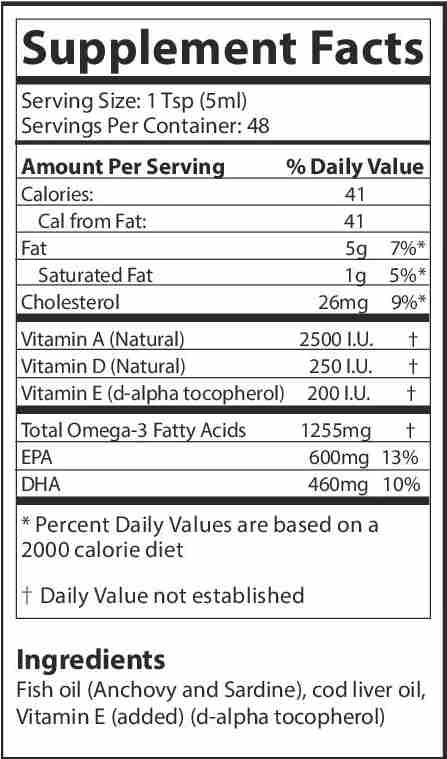
Suggested Dosage: To be taken once per day. Add to food based on weight chart.
Therapeutic Dosage: Double the quantity for maximum period of 4 weeks or follow veterinarian advise.
Pet’s Weight Dosage
0-15 lb = ¼ tsp
15-30 lb = ½ tsp
30-60 lb = 1 tsp
60-90 lb = 1 ½ tsp
How to Administer: Shake well before use. The easiest method is to add the dosage to your pets food. Some pets can be finicky, if this occurs consider hiding the appropriate amount in food most pet’s love such as fish, chicken, yogurt, or a favorite treat. If your pet only eats dry food then soak kibbles at feeding time.
For Best Results
Dietary supplements are beneficial to the health and well-being of your pet and are safe for long-term use. Every pet responds to natural supplements differently, therefore it is important to be consistent and administer the product daily. Supplements generally take two to four weeks to take effect, however this will vary from one animal to the next.
Product Storage
All NHV Natural Pet Products contain no artificial additives, preservatives or coloring. Shelf life after opening is 6 months and must be refrigerated after opening.
Cautions and Contraindications
Avoid During Pregnancy.
Our cat omega 3 supplement is naturally made from the oils of sardines, anchovies, and North Atlantic cod. It’s an excellent source of EPA (Eicosapentaenoic Acid 600mg) and DHA (Docosahexaenoic acid 460mg) essential omega 3 fatty acids. It’s molecularly distilled and cold-pressed to improve the bioavailability
Support your cat with human-grade quality omega 3 fish oil supplements. Many processed pet foods are deficient in this important nutrient. And according to the University of Maryland Medical Center, "It is very important to maintain a balance between omega-3 and omega-6 fatty acids in the diet. A proper balance helps maintain and even improve health."
It’s important for cats to get essential fatty acids through their diet. This omega 3 supplement for cats will help keep them healthy, and even finicky cats actually like to take it.
Benefits of Cat omega 3 supplements:

Suggested Dosage: To be taken once per day. Add to food based on weight chart.
Therapeutic Dosage: Double the quantity for maximum period of 4 weeks or follow veterinarian advise.
Pet’s Weight Dosage
0-15 lb = ¼ tsp
15-30 lb = ½ tsp
30-60 lb = 1 tsp
60-90 lb = 1 ½ tsp
How to Administer: Shake well before use. The easiest method is to add the dosage to your pets food. Some pets can be finicky, if this occurs consider hiding the appropriate amount in food most pet’s love such as fish, chicken, yogurt, or a favorite treat. If your pet only eats dry food then soak kibbles at feeding time.
For Best Results
Dietary supplements are beneficial to the health and well-being of your pet and are safe for long-term use. Every pet responds to natural supplements differently, therefore it is important to be consistent and administer the product daily. Supplements generally take two to four weeks to take effect, however this will vary from one animal to the next.
Product Storage
All NHV Natural Pet Products contain no artificial additives, preservatives or coloring. Shelf life after opening is 6 months and must be refrigerated after opening.
Cautions and Contraindications
Avoid During Pregnancy.
Published: June 29, 2022